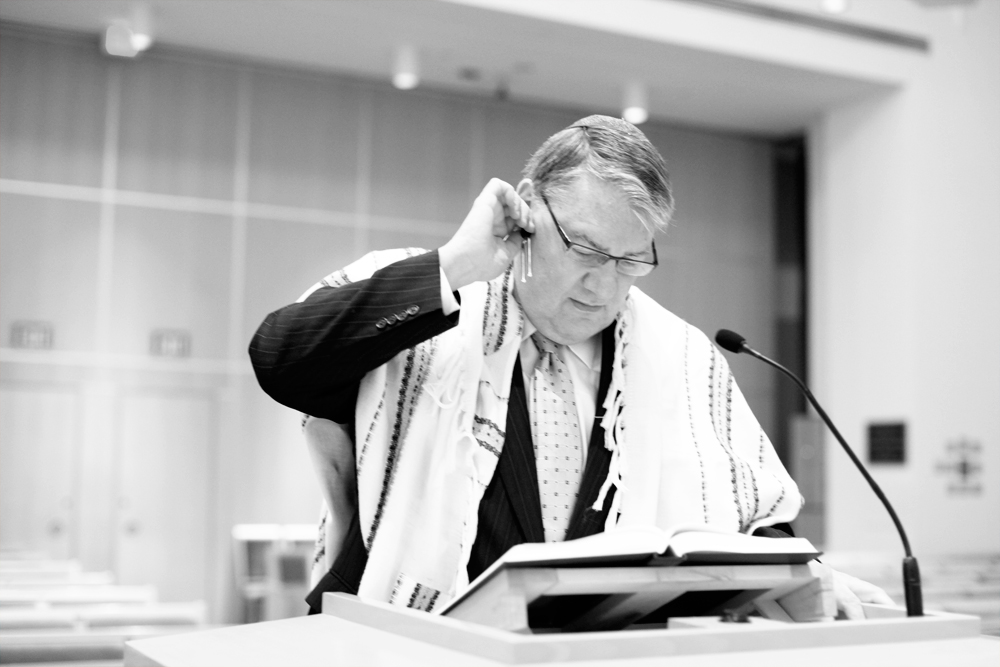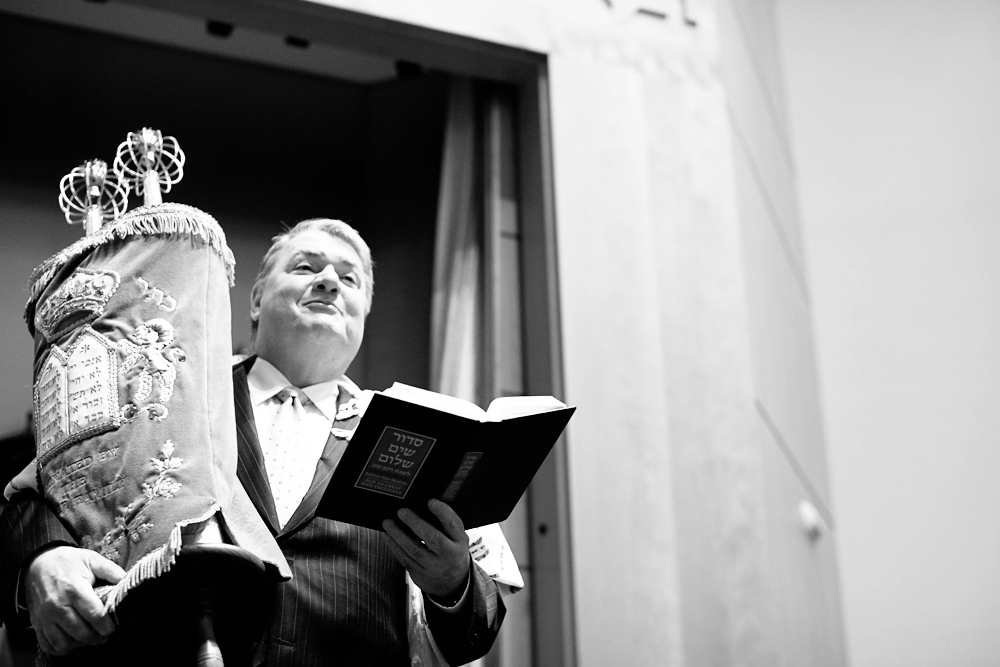My first Shabbes
I once served with a Rabbi named Bernard, called “Bernie” by his friends. Before I came to the congregation, I had done my homework. It seems as though Bernie was known as a “Cantor Killer”—a Rabbi who goes through Cantors like Grant took Richmond. I remember getting a call late Friday night (yes, I answer the phone on Shabbes) from the colleague who had the position before me. He and I were good buddies, and I knew him to be a talented and tough guy. I answer the phone, and all I hear is somebody trying to catch his breath. I soon realized that the person was crying. I said, “Whoever this is, calm down and talk to me.” When he started to speak, I knew it was my friend David. He said, haltingly, “In the middle of singing Hashkivenu (A prayer in the evening service that is often sung in a formal way by the cantor), my Rabbi snuck up behind me, and whispered in my ear: “Da-veed, did you have to sing that high note?” These were the type of games that Bernie would play.
David went off to greener pastures, and because of the excellent location and potential of the Synagogue (plus my inner conviction that I could make anyone like me), I decided to audition for the pulpit. By then, the shul had a national reputation. It was known as the “Hatfield and McCoy Synagogue,” divided up between the Bernie-lovers and Bernie-haters. My first brush with the dysfunctional nature of the place came during the negotiation of my contract. They offered me a number, I came back with a slightly higher number, and they said, “Sorry, take it or leave it.” I took it, believing in my talent and ability to turn things around once they got to know me.
The position came with a parsonage home for the Cantor. When it came time for my first Shabbes, the house was undergoing repairs. So I was invited to spend Shabbes at the Rabbi’s home. It was summertime, and Friday evening services were called for 7 pm. I arrived at the home at around 5 pm and was greeted by the Rabbi’s wife, Esther, who told me the Rabbi was upstairs resting. Esther, a seemingly lovely and unassuming woman, showed me to my room, where I changed clothes in preparation for the oncoming Sabbath. I came down at about 6:15 pm, nice and early, for a fifteen minute walk to shul. The downstairs was deserted till around 6:40 pm, when Esther appeared and said, “Bernie is upstairs reading.” Hmmmmmm… Am I going to be late to my first service in a new position? Well, if the Rabbi isn’t there either, am I still considered late? What the hell is going on? I started pacing. At 7 pm, Esther went upstairs. Ten minutes later, Bernie sauntered down the steps with newspaper in one hand, and tie in the other. He nodded twice and said, “Esther, I guess you’d better drive us to shul.” Serene Rabbi and Frazzled Cantor arrive at 7:25 pm to a bored looking congregation with a “What else is new?” expression on their faces.
While walking back home after services, Bernie asked me after nodding twice, “What shall I call you?” I said, “Please call me Jack.” Two nods later, he says: “Ok, YA- A-KOV.” The fun begins…
Dinnertime.
I was escorted to a large dinning room with a huge, ornate, antique table. Bernie sat on one end, Esther on the other, and Mendelson in the middle. During the serving of the soup, it began to thunder. I remember the scene as if in black and white—straight out of the movie “Young Frankenstein.”
After a particularly loud thunderclap, Bernie nods twice and said to Esther in a caressing whisper, “Esther… do you remember last month when it stormed like this?”
Esther replied, “Yes.”
Nod, nod, and Bernie said, “Esther, do you remember… you were… afraid?”
Esther, clearly embarrassed, shot me a quick look and said: “Yes.”
With a voice like silk, nodding slowly, Bernie said: “Do you remember… I held you?”
Esther croaked, “Yes.”
Time stopped.
I was in a trance.
As if I were underwater, I heard a male voice saying, “Do you remember… it felt good?”
At this point, dying to run upstairs and call my wife, I instead cleared my throat loudly, and said, “Great soup!”
After dinner, the rain stopped, and Bernie suggested we take a walk, and he would show me the neighborhood. The walk was pleasant, and he showed me some of the magnificent homes in the area. About fifteen minutes in, he stopped, looked at me, nodded twice, and said: ” YA-A-KOV, I need your help in an important matter.” Ever the attentive underling, I said with conviction: “Sure, sure, anything you need.”
During the next nodding routine, I realized what all this nodding was about.
The look on his face during said nodding was one of confidence and kinship, as if by virtue of him nodding, you knew he was going to be right.
He then said, “I need your help… in the ministry… of the dead.”
Desperate to speak to my wife, I said, “What do you mean?”
He explained, “When I do funerals, being a busy man, many times I cannot go to the cemetery for the interment. I will need you to do this for me.”
Ahh… So he didn’t want to get mud on his shoes.
Later, I would discover that he had a genuine aversion to and discomfort with funerals and hospital visitations. (Too bad he was a Rabbi!) The distaste was somewhat ameliorated when the family in question was one of means. He called such families “Quality Families”—as in when asking me to perform at a wedding he would say, “Don’t worry YA-A-KOV, it’s a “Quality Family” (expect a nice honorarium). But, I digress…
On Shabbes morning, I went to shul myself, as Esther told me not to wait, and that Bernie would get there when he got there. He arrived toward the end of the shacharit (morning) service, and before the service for taking the Torah scroll out of the ark. Bernie did not give a formal sermon, but instead gave a running commentary during the Torah reading, as well as a longer talk before the prayer for the government. His commentary was brilliant. He would speak in a very quiet, informal way, almost as if we were all in his living room. He was clearly a master of his craft. As the service ran its course, we came to the blessing of the new month, a beautiful plea by the Cantor for God to bless the congregation with life, health, sustenance, etc. This is the moment that truly belongs to the Cantor, a chance to demonstrate “Chazzanut,” the uniquely Jewish art/prayer form that is the foundation of his/her training.
Facing the congregation, I rapped my tuning fork on my knuckles. I brought it up to my ear to hear the musical note “A,” from which I would find the desired key to sing in. I took a breath, and as I was about to start, I heard a whisper in my ear. “YA-A-KOV, I’ll have a comment about your shacharit later.” As I was facing the congregation, I didn’t see that the rabbi had snuck up behind me. With bump in stomach, I managed to get through the prayer.
After services, we adjourned to the social hall for kiddush/lunch. I naturally expected to be welcomed individually by congregants, but very little of that happened. Instead, people broke up into groups, talking heatedly. With bagel and whitefish salad in hand, I walked to and fro, trying to get the gist of what all the excitement was about. I soon realized that they were caucusing. Each group was discussing whether the Rabbi should go or stay. I didn’t know that within a few short weeks, there would be a congregational meeting to decide Bernie’s fate (At that meeting, over one thousand people attended, complete with police presence to minimize the blood flow. The tally came to five hundred plus to keep him, and four hundred plus to give him the boot). As I was walking around the social hall, I was stopped by an older man sloppily chewing on a piece of pickled herring with cream sauce. I noticed that Bernie was behind me, with herring man in front of me. He poked me on the chest, and loudly exclaimed in a European accent, while spitting out herring sauce on the sibilants, “KENTERRRR, KENTERRRR! HE’S KILLING US. HE’S KILLING US!”
Later, after the service for the conclusion of the Sabbath was over, Bernie summoned me to his office. He motioned me to a seat, and promptly began making phone calls. After sitting there for a good ten minutes he looked at me, nodded twice, and said: “YA-A-KOV, you repeated several words in the shacharit service this morning” (Some rabbis, mostly Orthodox, feel that it is disrespectful to repeat the words of the liturgy during prayer. When a good Cantor does so, it’s usually for interpretive emphasis, trying to serve the text). I replied, “Many of our texts are set in a metric form for the sake of congregational singing, and repetition is crucial to keep the meter. I noticed that you were singing along with the congregation, and seemed pleased in the moment.” He gave a double nod, and replied: “YA-A-KOV, YA-A-KOV… When a friend is trying to help you, you should heed his words, because, after all, I am your best friend…”




